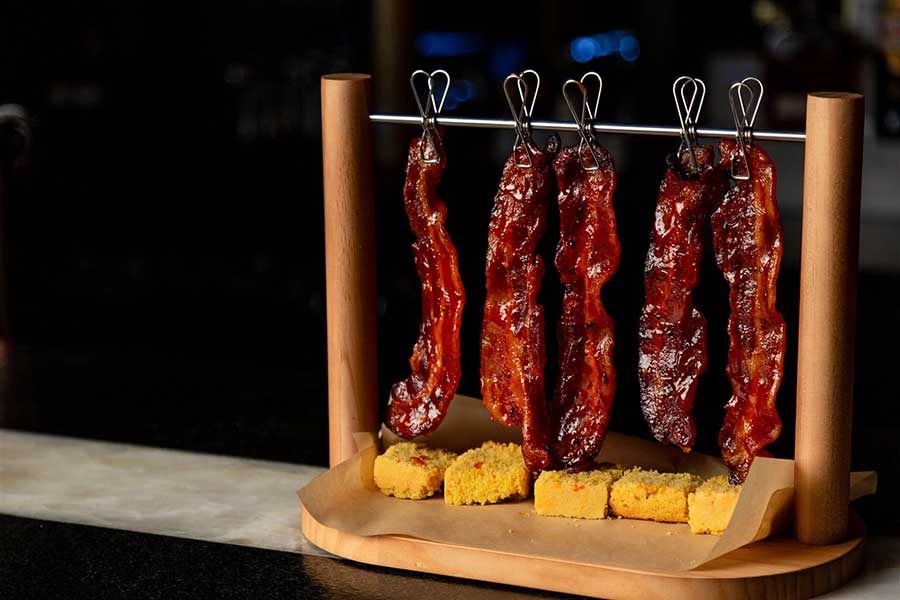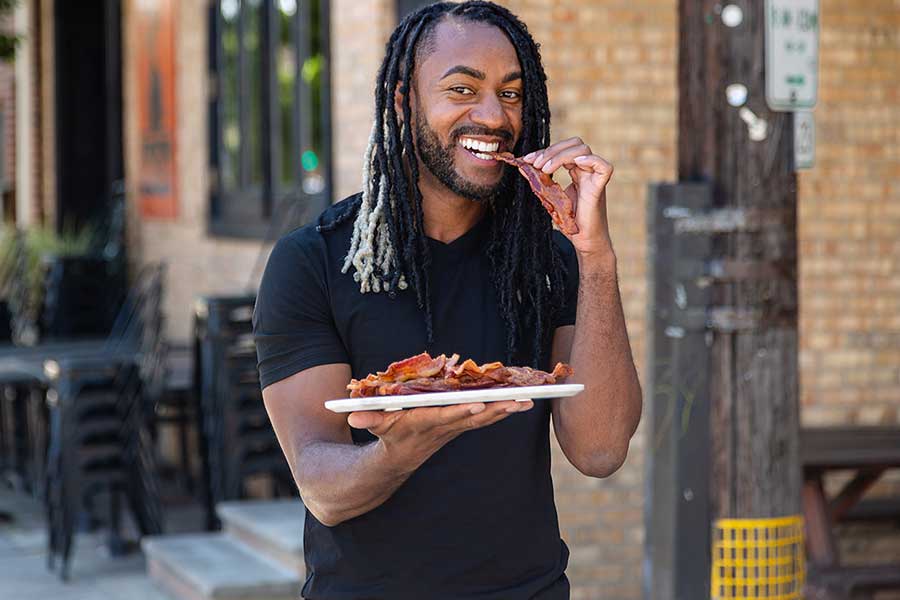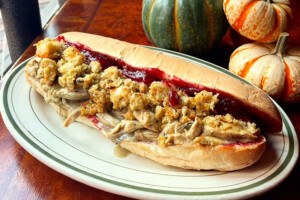A Tale of Two Bacon and Cornbread Dishes
A recent dispute over a hanging bacon dish reveals a deeper discussion we need to have about the history of Black American cuisine.

Bake’n Bacon’s Hang’n Bacon / Photograph by Morgan Rogers Burns Photography
Earlier this week Ernest Owens, Philadelphia magazine’s political writer at large and Eater Philly’s food editor, took to Instagram, claiming that Fitzwater Cafe had stolen a dish from Bake’n Bacon, the new Black-owned bacon-centric restaurant located just a few blocks away.
“Yesterday, @fitzwatercafe just released the “Billionaire Bacon and Corn Bread” — a total hijack of @baken_bacon’s “Hang’n Bacon” that’s not far down the block from them,” Owens wrote in his post.
The resemblance between the two dishes is uncanny. Both have five strips of bacon hanging from a miniature rack above five pieces of cornbread. The similarities don’t stop there. As Owens points out in his Instagram post, Bake’n Bacon has been referring to their bacon as “millionaire bacon” for some time. There is also no question as to who between the two was the first to bring out the hanging-bacon-cornbread combo; it’s been on the menu at Bake’n Bacon since they opened this past December and has been center stage in nearly all the restaurant’s local media coverage. “We sell more hanging bacon a week than we do our signature entrees,” Bake’n Bacon’s owner, Justin Coleman told me over the phone. “That is our number one seller.”
Fitzwater Cafe responded by posting screenshots of similar dishes featured on menus across the country to their Instagram Stories. “This isn’t an original idea — it’s been around for years and years,” Fitzwater Cafe said in a message sent to Owens which he posted to his Instagram Stories. Fitzwater Cafe added, “it’s very sad that you are pushing race and division over a food item.”
It is true, it’s not a new concept. Bankroll had a $26 bacon-hanging appetizer, also called Billionaire Bacon, but it disappeared pretty quickly when the restaurant unceremoniously closed within three months of opening; the racks they used to hang the bacon were even auctioned off.
However, none of the examples Fitzwater Cafe shared had cornbread. The cornbread was Bake’n Bacon’s personal take on the concept, which has cultural relevancy considering cornbread is a staple food in Black American cuisine. Prior to this they were the only restaurant in Philadelphia serving bacon suspended over cornbread. After Owens pointed this out to Fitzwater Cafe, they posted to their Instagram Stories a screenshot from a Google search highlighting that the dish’s origins are from Native American cuisine. (Coleman has identified himself as Native American as well.)

Screenshots from @mrernestowens Instagram Stories depicting the two hanging bacon dishes
“There is nothing new under the sun,” Coleman posted in a two-part video on Instagram addressing the controversy (go here to watch part one and here to watch part two). In my phone call with Coleman, he explained that Fitzwater Cafe’s response was what got to him the most. “If I am inspired by something, I would definitely say ‘Oh, I saw this here.’ And I’d want to do my own take on it,” he said. “Historically speaking, there are so many times where people of color have worked so hard to do great things, and then someone else steals it, and then just pretends like it didn’t happen.”
I reached out to Fitzwater Cafe and spoke on the phone with the chef Stacey Ann who says she was unaware that Bake’n Bacon had a hanging bacon dish. “We talked about hanging bacon because I actually saw that in 2018,” she said, adding that they ordered the hangers off Amazon last week. She also explained that the reference to “Billionaire Bacon” was inspired by Snoop Dogg’s Billionaire Bacon recipe featured in his cookbook, From Crook to Cook. “We’re chefs, we’re supposed to be creative,” Ann said. “If people were to recreate something that I did, I would be flattered.” There are no plans to sell Billionaire Bacon at Fitzwater Cafe in the future – the item was a special on the menu. But Ann confirms that they do plan to use the racks for prosciutto in the future.
This whole situation brings up questions about who can claim ownership of a cultural dish, when does a dish become part of a culture’s cuisine, the history of Black resilience and survival in America, and all the power dynamics at play. And the rhetoric Fitzwater Cafe has employed here is not uncommon. Expressing sadness when being held accountable, the denial of cornbread’s cultural significance by pointing out that Black Americans got it from Native Americans, and the thought-terminating cliché of “pushing race and division,” are, unfortunately, the kinds of responses frequently used to stop any meaningful discourse before it can begin.
But this is a teachable moment. As the mixed-race food editor of Philly Mag and host of Delishtory, a PBS digital series all about food history, let me take a moment to codeswitch this for people who may not understand why it’s so upsetting to the Black community.

Owner and Chef Justin Coleman in front of the new Bake’n Bacon restaurant / Photograph by Morgan Burns Photography
This isn’t really about who did it first. Even Coleman acknowledges that Bake’n Bacon wasn’t the first to serve bacon on a rack. This is about how history influences the way a dish is executed and the cultural stories that the dish carries with it. Cultures have been exchanging ingredients, culinary techniques, and dishes for millennia. But once that food passes through the hands of one culture, it changes. Those changes tell stories about global trade, conquest, migration, and survival. And when those changes happen, the dish takes on an entirely different meaning — it takes on a context that becomes inextricably intertwined with that culture’s identity.
Cornbread is one of those dishes. Yes, it has its origins in Native American cuisine. Corn is indigenous to the Americas and has been a staple crop here for about 10,000 years. But the cornbread we know today has been heavily influenced by Black Americans and is deeply connected to the resilience and survival of enslaved people. Corn was an important part of an enslaved person’s diet. It was a reliable food source they could grow in designated plots and was used to supplement their meals, hence why cornbread, grits, fritters, Johnny cakes and other corn dishes are woven into the fabric of the cuisine. The same goes for barbecue, a Native American cooking technique that transformed once it was adopted by enslaved people and is now distinct to Black American history and cuisine.
Another thing we need to consider in this discussion are the power dynamics at play. Historically, when Europeans took ingredients and dishes from other cultures, it was to expand their wealth and influence, and grow their cultural capital. When ingredients and dishes from Native cultures were shared with enslaved people, it was for survival. Enslaved Africans did not come to America by choice. They were stolen from their homelands and forced to adapt to a continent that was completely unfamiliar to them. Thus, Black American food is inevitably the interpretation of African cultures expressed through what was readily available in the American colonies.

Cornbread / Photograph by Kevin Trimmer/Getty Images
The direction in which power flows is also key. White slave owners often had enslaved people as chefs. Most of what we think of as American food has actually been shaped by Black Americans. But because history is written by those in power, many of these contributions are misattributed to wealthy white men who had no qualms taking credit for Black people’s accomplishments.
Prolific slave owner Thomas Jefferson often gets credit for popularizing mac and cheese as well as ice cream, but the credit should really go to his enslaved chef, James Hemings, who served these dishes at Monticello after training in France. Jack Daniel’s is known as America’s first registered distillery, but their first master distiller was Nathan “Nearest” Green, a Black American who specialized in a sugar maple charcoal filtering process that would later be called the Lincoln County process. That charcoal filtering process comes from West Africa and is what makes Tennessee whiskey its own distinct style of whiskey.
After Emancipation, through Reconstruction, the Great Migration and beyond, Black American innovators and entrepreneurs like Bake’n Bacon continue to be the stewards of American cuisine, evolving it and improving it, but also preserving it. That’s why when cornbread, barbecue, mac and cheese and even ice cream (shout out to butter pecan) appears on a Black-owned restaurant’s menu, it’s a nod to the community that says we’re not just surviving – we’re thriving.
Of course, Fitzwater Cafe and any other restaurant has the right to serve whatever they want. And diners have the right to feel the way they feel about this and similar situations that keep happening. But if we understand that there’s been a pattern in this country of taking people’s culture away and downplaying the impact that has, then we’ll understand why a bacon and cornbread dish can spark such feelings. And rather than becoming defensive, the goal here should be to listen and try our best to break this cycle, particularly during a month meant to honor and appreciate Black History.
Yes, the hanging bacon dish has been done before. Cornbread was first created by indigenous nations across North America. The cherrypicked facts are correct but neglecting the historical context takes away from the truth; that the story of Black American cuisine begins when Africans were stripped of their identities. But in their resilience, their cultures adapted to become what we now recognize as the African diaspora; a multitude of cultural identities that keep people connected through their shared stories of survival.
And taking aspects from that culture while simultaneously denying Black Americans ownership of it is an insult to hundreds of years of injury.


